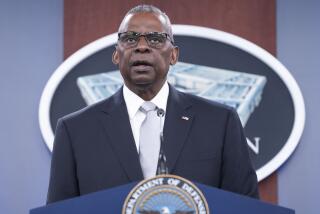Kennedy Urges Europeans to Expel All Libyans, Join U.S. in Sidra Maneuvers
- Share via
WASHINGTON — Calling for “a dramatic escalation” in sanctions against Libya, Sen. Edward M. Kennedy on Tuesday urged that the European allies expel all Libyans, cut off all economic relations with the country and join the United States in any future naval maneuvers in the Gulf of Sidra.
For the most part, the allies so far have refused to participate in the Reagan Administration’s economic sanctions against Libya, but the Massachusetts Democrat said that European countries should no longer expect to get a “free ride” in the struggle against Libyan-sponsored terrorism.
He pointed out that fear of terrorism already has caused large numbers of Americans to cancel flights to European cities this year, and he said he will urge that the United States send the allies a pointed message about the need for their cooperation on sanctions by avoiding any travel to Europe this summer.
Warning to Travelers
The Administration recently has cautioned Americans to be careful when traveling to certain cities in Europe but has stopped short of urging that they avoid traveling there.
The Europeans “have to become involved,” Kennedy declared during a breakfast session with The Times’ Washington Bureau. “And I would hope that the Administration would take a very tough position on it. I would expect that they would.
“Every one of the European countries ought to prohibit Libyan planes from landing or any domestic flights from flying to Libya,” he said. “There ought to be an economic embargo for any Libyan products, and there has to be a dramatic escalation in economic sanctions. And the United States clearly ought to lead the way, and this ought to be the top priority.”
Degrees of Pressure
The United States, accusing Libya of supporting terrorism, has sought to put economic pressure on the country in stages since 1977, when President Jimmy Carter banned the export of aircraft for military use and tractors capable of hauling tanks.
Reagan banned the import of Libyan crude oil in March, 1982, prohibited the importation of refined petroleum products last November and issued an executive order last January directing all Americans to leave Libya and severing virtually all commercial contacts.
But, without European support, the sanctions have had only a slight impact. And instead of isolating Col. Moammar Kadafi, they have generated support for the Libyan leader among Arab countries.
Despite appeals by Reagan, who called on “our friends in Western Europe and elsewhere to join with us in isolating” Kadafi, the allies have refused to close any Libyan embassies. About the only cooperation with the U.S. policy of economic sanctions has been Italy’s embargo on sale of weapons to Libya.
A Cooperative Effort
However, the Europeans are beginning to lean toward a cooperative effort, White House Chief of Staff Donald T. Regan said. He cited France’s expulsion several days ago of two Libyan diplomats suspected of terrorist activities.
Speaking to a small group of reporters Monday, Regan said that as the allies have become aware of the “magnitude of the problem of terrorism,” they also have become “more strict” on issuing visas and have put suspected Libyan terrorists under closer observation.
Kennedy said he fully supports Reagan’s get-tough policy, including last month’s air attack on at least two patrol boats in the Gulf of Sidra and a missile base in Libya in response to a Libyan missile attack on U.S. naval forces.
Asked about further military reprisals, he said he first would escalate economic sanctions but added: “You don’t rule that out. . . . I would hope that any kind of future naval maneuvers in the Sidra would have a European contingent.”
More to Read
Get the L.A. Times Politics newsletter
Deeply reported insights into legislation, politics and policy from Sacramento, Washington and beyond. In your inbox twice per week.
You may occasionally receive promotional content from the Los Angeles Times.










